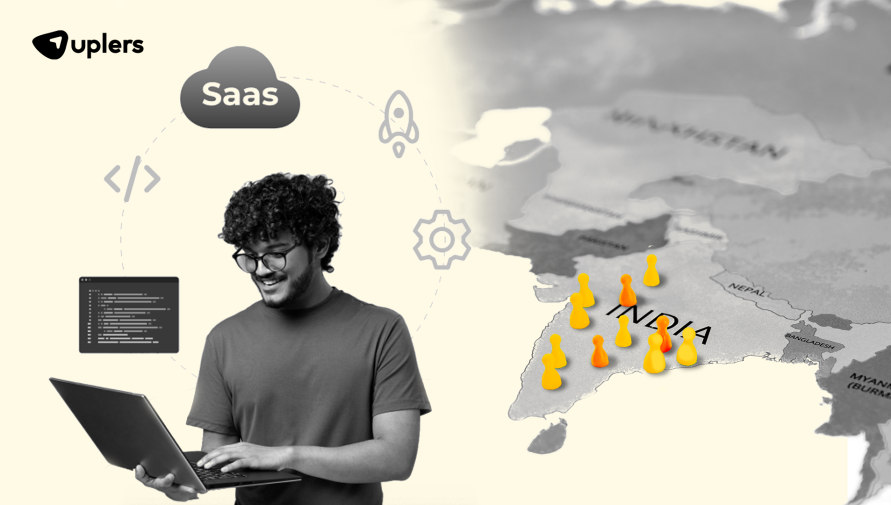Why Global Companies Choose to Hire SaaS Developers from India
- Sathvik Poojary
- July 20, 2025
- 4 Minute Read

Global SaaS growth is not merely restricted to product innovation in 2025. It’s more inclined towards the velocity of execution, cost-efficiency, and distributed engineering strength. The talent war continues as a result of the widening skills gap, but act like a smart SaaS company and don’t try to outbid Silicon Valley salaries.
Instead, shift your hiring lens towards strategic and globally dispersed teams, and with regards to this discussion how can you miss India?
India is at the heart of this transition. With cloud-native stacks becoming the standard and Product-Led-Growth (PLG) strategies dominating the go-to-market (GTM) models, founders and CTOs are increasingly looking to hire SaaS developers. You need experts who have an understanding of the business impact just as much as they do in technical execution. And an increasing number of hiring managers are turning to India, not just for scalability, but for quality, agility, and alignment.
Let’s shed some light on these aspects of the India-first hiring angle and help you hire better.
India’s Rise as a Product-Driven SaaS Talent Hub
If you are still under the impression that offshore teams are purely for backend support then it’s a thing of the past. In 2025, India is home to over 23,384 SaaS startups, with unicorns like Freshworks, Postman, Zoho, Shiprocket, Darwinbox, and many more.
This proves that the country isn’t simply a delivery center, instead it’s a SaaS innovation hub. Why do you think this should matter to you when you are deciding as a global hiring leader?
What it means when you hire SaaS developers from India today is that, you are not just hiring coders, but you are tapping into a mature ecosystem of engineers who:
- Understand B2B SaaS models and subscription metrics.
- Have fluency in microservices, kubernetes, and API-first architecture.
- Know how to align tech work with revenue-driving GTM initiatives.
This shift in maturity makes SaaS startups hiring Indian talent not only a cost-cutting move, but a value-maximizing decision. You get developers who not only ship code, rather ship features that move KPIs.
Business-Aligned Development: How Indian Talent Supports GTM and PLG
Modern SaaS engineering is about building fast plus building for outcomes. Today SaaS developers in India are working at the intersection of product, engineering, and customer success. Several of them are trained in PLG thinking, contributing directly to:
- Self-service onboarding flows
- In-app user behavior tracking
- Feature flags for usage-based pricing models
- Scalable architecture for multi-tenant deployments
From building dashboards that track MRR to deploying real-time analytics pipelines and driving retention, Indian teams are increasingly embedded in the product pods. They are no longer confined to being ticket takers in sprint backlogs.
This makes them ideal partners for scale-ups that wish to hire SaaS developers who think strategically and ship tactically. For CTOs exploring infrastructure-led growth, this will also open the door to scale by hiring cloud engineers for modern SaaS solutions – especially ones trained on AWS, Azure, or GCP with real-world exposure in distributed systems.
Micro-Ecosystems in India: City-Level Specialization in SaaS Skillsets
India is not a monolith, it’s a network of micro-talent ecosystems that specialize in different verticals and technologies. Smart hiring managers are increasingly geo-targeting the talent within India based on the product needs.
Bangalore
Deeply talented and skilled experts in cloud engineering, microservices, and AI/ML in SaaS.
Chennai
Proficient in FinTech SaaS, DevOps, and security compliance.
Pune
Highly regarded for CRM, martech SaaS, and scalable architecture design.
Hyderabad
A hub for enterprise-grade SaaS and full-stack development.
Ahmedabad
Growing network of React/Node.js engineers and mid-sized product teams.
This geographic segmentation helps global companies finding and hiring SaaS developers skilled in cloud infrastructure, based on their product architecture and user volume expectations.
To top it off, hiring platforms like us have made it simpler to tap into a network of AI-vetted experts. From a 3M+ network only the top 3.5% talent makes it to your inbox after undergoing a rigorous AI-vetting process. At Uplers we aim to offer you the finest talent with minimal guesswork and up to 40% cost-advantage. Backed by a 30-days risk-free trial and a lifetime free talent replacement, you can hire SaaS developers faster and with confidence.
Communication, Collaboration, and Cross-Time Zone Strengths
One historic concern that has always bothered hiring managers with offshore development is the time zone misalignment and communication hindrances. But in 2025, these gaps have dramatically narrowed down.
Present-day top-tier Indian SaaS developers:
- Are fluent in working with tools such as Jira, Slack, Linear, Notion, and Loom.
- Are trained in async-communication and remote-first rituals.
- Participate in sprint planning, OKR alignment, and user story reviews.
- Present roadmap proposals instead of just responding to JIRA tickets.
Several teams now use a “follow-the-sun” model meaning Indian developers overlap partially with US mornings or EMEA afternoons – offering 16-20 hours of product velocity per 24-hour cycle.
When you hire cloud engineers from India, you are not just bridging the cost gap but creating an operational leverage. It’s an edge that compounds over product cycles, enabling faster iteration and quicker GTM adjustments.

Final Thoughts: Unlocking Scalable SaaS Growth with Indian Developers
The SaaS ecosystem in India has undergone a vivid transformation from service-delivery to full-stack product innovation. As tech companies double down on PLG and cloud-native strategies, the choice to hire SaaS developers from India becomes stronger. This is not just for efficiency, but for a strategic advantage.
In a hiring landscape where speed, quality, and domain expertise can make or break your product cycle, Indian developers introduce:
- A product-led mindset
- Deep technicalities in cloud-native and scalable infrastructure
- Remote collaboration readiness
- Embedded knowledge of SaaS business models
Therefore, to build future-ready engineering pods, India-first hiring approach is not a fallback – it’s a force multiplier.






